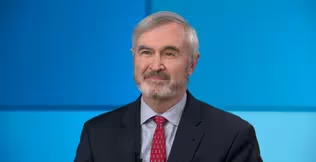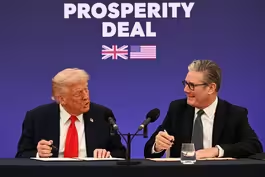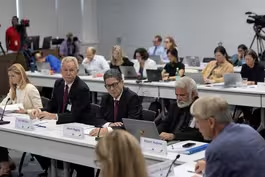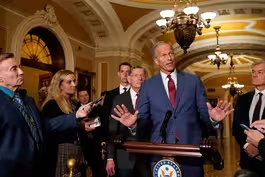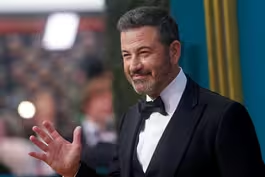
War ends when Gaza is free of Hamas, Israeli ambassador says
Clip: 9/18/2025 | 7m 58sVideo has Closed Captions
Israeli ambassador to U.S. says war ends when Gaza is 'free of Hamas'
This week, Israel intensified its military campaign in Gaza City and an independent United Nations human rights commission concluded that Israel’s action in Gaza constituted genocide. Nick Schifrin spoke with Israeli Ambassador to the U.S. Yechiel Leiter to discuss the operation in Gaza City, Israel’s long-term plans and the recent strike in Qatar.
Problems playing video? | Closed Captioning Feedback
Problems playing video? | Closed Captioning Feedback
Major corporate funding for the PBS News Hour is provided by BDO, BNSF, Consumer Cellular, American Cruise Lines, and Raymond James. Funding for the PBS NewsHour Weekend is provided by...

War ends when Gaza is free of Hamas, Israeli ambassador says
Clip: 9/18/2025 | 7m 58sVideo has Closed Captions
This week, Israel intensified its military campaign in Gaza City and an independent United Nations human rights commission concluded that Israel’s action in Gaza constituted genocide. Nick Schifrin spoke with Israeli Ambassador to the U.S. Yechiel Leiter to discuss the operation in Gaza City, Israel’s long-term plans and the recent strike in Qatar.
Problems playing video? | Closed Captioning Feedback
How to Watch PBS News Hour
PBS News Hour is available to stream on pbs.org and the free PBS App, available on iPhone, Apple TV, Android TV, Android smartphones, Amazon Fire TV, Amazon Fire Tablet, Roku, Samsung Smart TV, and Vizio.
Providing Support for PBS.org
Learn Moreabout PBS online sponsorshipWILLIAM BRANGHAM: This week, Israel has intensified its military campaign in Gaza's largest city, destroying high-rises and telling people there to evacuate to the south.
For more, Nick Schifrin speaks with Israel's top diplomat in Washington.
NICK SCHIFRIN: To discuss Israel's operation in Gaza City, as well as Israel's long-term plans for Gaza and the West Bank, as well as the recent strike in Doha, Qatar, I'm joined by Israel's Ambassador to the United States Yechiel Leiter.
Ambassador Leiter, thanks very much.
Welcome back to the "News Hour."
Let's start in Gaza City.
The IDF announced this week the beginning of the second phase of an operation it described as designed to take over the city and defeat Hamas.
What do you define as victory in this operation?
YECHIEL LEITER, Israeli Ambassador to the United States: The long-term final day or day after Hamas and Gaza is exactly that, a Gaza that's free of Hamas.
We don't have a war with the people of Gaza.
We have a war with Hamas.
And we believe that we need to defeat Hamas permanently.
And we're actually standing on five points, ultimately, number one, that Hamas is defeated and disarmed, that Gaza is demilitarized, that our hostages, our hostages, all of them, the dead and the alive, are home, and, number four, that Israel's security ultimately remains in Israel's hands and nobody else's, and, number five, that Gaza be rebuilt by an international consortium of countries that are interested in seeing Gaza be reconstituted as a civil society and not as a terrorist infrastructure.
NICK SCHIFRIN: In February 2024, Prime Minister Benjamin Netanyahu said about a pending assault on Rafah -- quote - - "Total victory is within reach, not months away, weeks away, once we begin the operation."
Yet here we are, 19 months later, and the prime minister is once again promising that the Gaza City operation will lead to victory.
Don't senior members of the Israeli military who have resisted this operation have a point, that the prime minister is chasing a victory here that could be impossible to achieve?
YECHIEL LEITER: No, I don't think so.
War is difficult.
Nobody wants this war to be over more than the prime minister and the people of Israel.
We're the people who have suffered here.
We don't want to prosecute a war that's unnecessary.
But we do need to achieve a situation where Gaza will no longer pose a threat to our civilians.
If we fought this war over two years, we have lost 900 soldiers, and if Gaza's to be reconstituted as a Hamastan, as a terrorist infrastructure state, what have we achieved?
There's no country in the world that would allow jihadi terrorists to man their borders, and we're not any different.
NICK SCHIFRIN: U.S.
officials have told me that Israeli officials have told them that this war, this fight in Gaza City could be over by the end of the year.
But Israeli military officials are telling me that it could take months, perhaps longer than that, and extend well into next year.
Are those military officials wrong?
YECHIEL LEITER: We have been right about assessments, and sometimes we're wrong about assessments.
I mean, we didn't know that there were 450 miles of terror tunnels underneath an area 24 miles long and eight miles wide.
There could be some surprises, but we have pretty good intel.
We have degraded them dramatically.
We started this war when they had some 30 battalions.
They're now down to four or five battalions.
We -- at the time the prime minister made those remarks, we were on about 30 percent of Gaza.
We now are in 75 percent of the Gaza Strip.
So what's left is Gaza City and some camps south of Gaza City, that's where our hostages are being held.
They refuse to release our hostages.
They refuse to step down and surrender.
Look, Nick, it could be over tomorrow.
If they release our hostages and lay down their weapons, the war's over.
NICK SCHIFRIN: But, as you know, senior members of the military have also expressed some concern that this operation will kill the 20 or so hostages who are living.
Just today, the mother of Matan Zangauker, who was kidnapped during the October 7 terrorist attack, said -- quote -- "How long will they sacrifice our children on the altar of this eternal war?
Cry out with us, enough.
End the war."
Does this operation not risk Matan and the other living hostages' lives?
YECHIEL LEITER: War unfortunately poses existential dilemmas that leaders have to face.
This is not the first time leaders have to face existential dilemmas.
What we know is that, of the 255 hostages that were being held, we have achieved the release of 207, 158 alive.
And it has not been done without applying military pressure.
So, we're applying military pressure.
NICK SCHIFRIN: But most of them were released through cease-fire and negotiations.
YECHIEL LEITER: No, it was because of the military pressure that the cease-fire worked.
Would there not be military pressure, there never would have been negotiations or a cease-fire.
NICK SCHIFRIN: Let's zoom out and talk about Israel's relationship with the world, especially Europe.
The European Commission, which, of course, is led by former Defense Minister Ursula von der Leyen, a traditional ally of Israel, has this week proposed downgrading trade ties with Israel.
And, this week, Prime Minister Netanyahu admitted this.
He said -- quote -- "In the coming years at least, we will have to deal with these attempts to isolate us."
And he described in Israeli economy that has to become self-sufficient.
Is that an admission that the long-term impact of how Israel is fighting in Gaza is going to be negative on Israel?
YECHIEL LEITER: Look, in the meantime, our economic indicators are quite encouraging.
We have got economic growth at a considerable rate, and we have investment pouring into the country.
So will there be a period of time where we may have to deal with international isolation?
We have been there before, and if we have to, we will do it again.
The important thing is to win this war.
NICK SCHIFRIN: Finally, Ambassador, let me turn to plans that France and Saudi Arabia have to chair a conference on Monday at the U.N.
General Assembly declaring Palestine an independent state.
The prime minister and Secretary of State Marco Rubio this week in Jerusalem suggested that Israel would annex parts of the West Bank in response to that declaration that's going to happen next week at the U.N.
Is that the step that you are about to take?
YECHIEL LEITER: I think everybody should expect, certainly the president of France, with their long history of committing acts of genocide in Africa, if he's going to act unilaterally, Israel's going to act unilaterally, and shouldn't be surprised if that's the case.
Look, we want to reach a situation.
We have changed the face of the Middle East.
Under Prime Minister Netanyahu's leadership, the Middle East is changing.
We have degraded the Iranian proxies.
We have degraded Iran.
What we want to do now is move into Abraham Accords 2.0.
That's not going to be accomplished by letting Hamas survive or by reducing Israel to a country that's nine miles wide, like it was before 1967.
So, if you're going to unilaterally declare Palestinian state, then we're going to have to act unilaterally in the opposite direction.
NICK SCHIFRIN: The minister for strategic affairs, Ron Dermer, has been quoted to me as saying by multiple officials lately that the threat is to annex the Jordan Valley in Northern West Bank.
Is that the plan?
YECHIEL LEITER: Look, I think that it's high time that Israel establish, once and for all, its eastern border.
And it's necessary for political reasons.
It's necessary for military reasons, and I think that's been proven.
We can't have any kind of threat to our borders.
And I think there's a consensus in Israel that our eastern border, a wide consensus -- 85 to 90 percent of the population believes that our eastern border with Jordan should be the Jordan River.
And if we now have that opportunity in the context of greater accommodation, in the context of normalization with Saudi Arabia and other countries in the Middle East, there's no reason why the Jordan River should not be established as our eastern border.
NICK SCHIFRIN: Ambassador Yechiel Leiter, thank you very much.
YECHIEL LEITER: Thank you, Nick.
How debt interest is becoming a problem for the government
Video has Closed Captions
Clip: 9/18/2025 | 7m 41s | How debt interest is becoming a bigger problem for the U.S. government (7m 41s)
John Malcolm on an originalist analysis of the Constitution
Video has Closed Captions
Clip: 9/18/2025 | 8m 28s | Heritage Foundation's John Malcolm on its new originalist analysis of the Constitution (8m 28s)
News Wrap: Trump wraps up state visit to the UK
Video has Closed Captions
Clip: 9/18/2025 | 6m | News Wrap: Trump wraps up state visit to the UK (6m)
Panel overhauled by RFK Jr. changes vaccine recommendations
Video has Closed Captions
Clip: 9/18/2025 | 7m 3s | CDC panel overhauled by RFK Jr. changes childhood vaccine recommendations (7m 3s)
Senate Republicans change rules to approve Trump nominees
Video has Closed Captions
Clip: 9/18/2025 | 3m 59s | Senate Republicans change rules to push through Trump nominees (3m 59s)
What Kimmel's suspension says about free speech under Trump
Video has Closed Captions
Clip: 9/18/2025 | 10m 23s | What the move to pull Kimmel off the air says about free speech under Trump (10m 23s)
Providing Support for PBS.org
Learn Moreabout PBS online sponsorship
- News and Public Affairs

FRONTLINE is investigative journalism that questions, explains and changes our world.

- News and Public Affairs

Amanpour and Company features conversations with leaders and decision makers.












Support for PBS provided by:
Major corporate funding for the PBS News Hour is provided by BDO, BNSF, Consumer Cellular, American Cruise Lines, and Raymond James. Funding for the PBS NewsHour Weekend is provided by...

